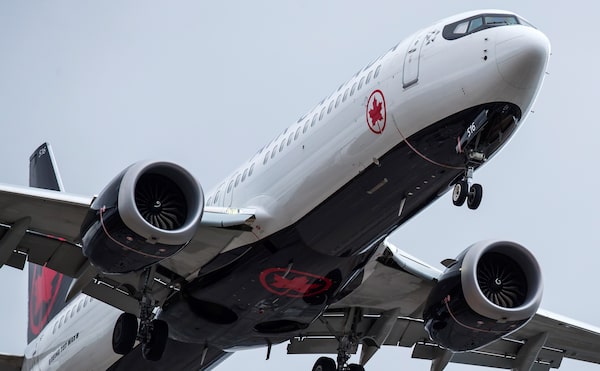
An Air Canada Boeing 737 Max 8 aircraft arriving from Toronto prepares to land at Vancouver International Airport, in Richmond, B.C. on March 12, 2019.DARRYL DYCK/The Canadian Press
Transport Minister Marc Garneau says Boeing’s Max 8 aircraft won’t be allowed to fly in Canadian skies until officials believe all safety concerns have been addressed.
He said in a statement Friday that Transport Canada will work with its American, European and Brazilian counterparts before giving the aircraft a stamp of approval.
Transport Canada officials took part in test flights of the 737 Max 8 aircraft in recent days and are analyzing the results before giving the thumbs-up to proposed changes to the aircraft.
Now, the plane will be further tested in Vancouver starting Sept. 7 under an agreement between Boeing, the U.S. Federal Aviation Administration and Europe’s aviation safety regulator.
Air Canada 787 jet among eight grounded by Boeing due to manufacturing defects
With a new round of test flights about to start, Garneau said he still expects the FAA and the company to prove the aircraft is safe.
Canada closed its skies to the Boeing aircraft after an Ethiopian Airlines flight crashed in March 2019, killing all 157 people on board, including 18 Canadians.
The crash, six minutes after takeoff from Addis Ababa, was eerily similar to one five months earlier when a Lion Air flight went down after takeoff from Jakarta, Indonesia.
“Transport Canada will not lift the flight restrictions on the Boeing 737 MAX 8 until the department is fully satisfied that all safety concerns have been addressed by the manufacturer and the FAA, and that enhanced flight crew procedures and training are in place,” Garneau said.
From Sunday to Tuesday this week, a Transport Canada test crew were flown daily between Seattle and Vancouver to evaluate the engineering simulator at the Boeing facility. Test flights over American airspace then took place on Wednesday and Thursday.
Transport Canada said that mitigation measures were put in place to prevent the crew from contracting the novel coronavirus which causes COVID-19.
Officials are analyzing the results and expect to complete their review this fall, at which time they’ll work with international counterparts to set minimum training requirements for the Max 8 to return to service.
The loss of the plane last year forced Air Canada and WestJet to cancel some routes and lease less fuel-efficient aircraft. Boeing also said it was putting a halt on production.
The EU Aviation Safety Agency said Thursday that Boeing still has some final issues to deal with on the aircraft, but the plane was ready for flight tests needed before the European body could approve the aircraft’s new design.
It said the COVID-19 pandemic threw a wrench into testing plans because of travel restrictions between the United States and Europe, which were resolved by holding test flights in Vancouver.
This content appears as provided to The Globe by the originating wire service. It has not been edited by Globe staff.